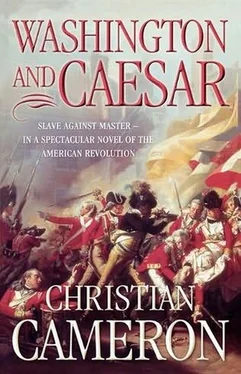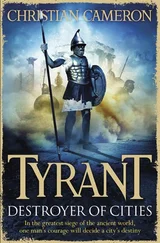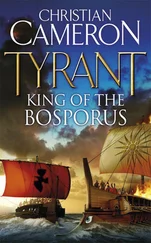Christian Cameron - Washington and Caesar
Здесь есть возможность читать онлайн «Christian Cameron - Washington and Caesar» — ознакомительный отрывок электронной книги совершенно бесплатно, а после прочтения отрывка купить полную версию. В некоторых случаях можно слушать аудио, скачать через торрент в формате fb2 и присутствует краткое содержание. Год выпуска: 0101, ISBN: 0101, Издательство: HarperCollins, Жанр: Исторические приключения, на английском языке. Описание произведения, (предисловие) а так же отзывы посетителей доступны на портале библиотеки ЛибКат.
- Название:Washington and Caesar
- Автор:
- Издательство:HarperCollins
- Жанр:
- Год:0101
- ISBN:9780007389698
- Рейтинг книги:3 / 5. Голосов: 1
-
Избранное:Добавить в избранное
- Отзывы:
-
Ваша оценка:
- 60
- 1
- 2
- 3
- 4
- 5
Washington and Caesar: краткое содержание, описание и аннотация
Предлагаем к чтению аннотацию, описание, краткое содержание или предисловие (зависит от того, что написал сам автор книги «Washington and Caesar»). Если вы не нашли необходимую информацию о книге — напишите в комментариях, мы постараемся отыскать её.
Washington and Caesar — читать онлайн ознакомительный отрывок
Ниже представлен текст книги, разбитый по страницам. Система сохранения места последней прочитанной страницы, позволяет с удобством читать онлайн бесплатно книгу «Washington and Caesar», без необходимости каждый раз заново искать на чём Вы остановились. Поставьте закладку, и сможете в любой момент перейти на страницу, на которой закончили чтение.
Интервал:
Закладка:
Tidewater, Virginia, October 1775
George Lawrence was a picture of martial ardor. He wore a fine blue coat with scarlet facings, like the Virginia Provincials had worn under Washington in the war against the French except cut in the latest style, with narrow lapels and less cloth everywhere. Followers of the military arts knew that this style reflected the growing military passion in Europe for all things Prussian; Frederick the Great had decreed that there would be less material in coats.
Lawrence had never paid much attention to his Latin or Greek, and his knowledge of mathematics was not on the firmest ground, but he had devoured all the military science that the booksellers of Williamsburg and London had to offer, against the day when he would don a uniform. And now he commanded a company in the Virginia militia. It was a start on his path to better things. In Boston, George Washington, another Virginian, was the commander in chief of a real Continental Army, the regular army of the colonies. Lawrence aspired to command a company in that army. To win the trust of Virginia would require success in Virginia and money. That started right here, at the recruiting table, where he was completing his company with any decent body he could get to sign the bill and take his bounty. Not every company offered a bounty, but he had the money, and it allowed him to pick and choose a little more.
His recruiting table sat in the yard of the King’s Arms Tavern, the best tavern in the town. No one else had yet seen the humor in the conflict between the name and his purpose, but he smiled every time he looked at the sign. Englishmen-that is to say, bankers and brokers-had driven his father to bankruptcy, broken them as a family, and taken their plantation. Patient work and a great deal of luck had restored the family fortunes through trade, but George never forgot the attitude of his father’s London brokers. They were greedier than Indians, and more rapacious. That is how Lawrence saw Parliament in London: as a group of brokers and bankers seeking to do unto America as Bailey and Callis, Brokers, of Bristol, had done to his family. He would raise men at the King’s Arms, but the arms they would bear would be against the king.
On his table lay broadsheets advertising the rates of pay and a rather hopeful view of the possibility of land grants at the end of the war, as well as the bounty and the country’s need. His best sergeant, Rob McCoy, sat behind the table in the same blue coat with red facings, a powerful image of martial splendor. Behind him stood Lawrence’s drummer, a young black, in reversed colors, a red coat with blue facings. Few of the militia companies had drummers, and even fewer had the money to ape European professionals and provide their musicians with reversed color clothing, but Lawrence was a stickler for such things. Besides, the boy was free and quite a talented drummer; with the coat, he got as many admiring stares as the sergeant.
Captain Lawrence nodded at the drummer, young Noah. “Point of war.”
That was the black boy’s great talent; he had actually spent so much time around the military camps that he knew most of the military beatings. He could beat for firewood details and signal officers’ call. He lengthened his captain’s reach beyond the sound of Lawrence’s already powerful voice. Lawrence spoiled him, because next to his veteran sergeant, the boy was the most valuable member of his company.
The boy smiled and the drumsticks flashed as he raised them beside his head, held them rock steady for a moment, and then brought them down like thunder on the taut skin of the drumhead. He rattled through the point of war like a regular army drummer, and every head on the street turned to watch.
“Serve your country and earn the bounty!” called McCoy. A piece of silver flashed in his hands.
“Five shillings hard specie! Drink to Virginia on the colony’s money! Preserve your rights against the grasping king! Drive Dunmore into the sea!”
It was as much excitement as the market town had seen in a long time. Rural Virginia didn’t see a great many fine laced coats, or drummer boys, or martial sergeants. Men began to come around, reading the proclamations and broadsheets on the table from a safe distance.
The first recruit they attracted here was typical: George Lake, an apprentice. He was healthy and fit, not indentured, and had enough teeth to bite a cartridge. He didn’t own his own weapon, which cost him part of his bounty, but he still got two shillings and a place to sleep. He looked intelligent and delighted to be part of the army. Once Lawrence had his name on the books and had given him his bounty in cash, he asked the young man if he would stay with the company if it were taken into the Continental service. The boy replied that he was sure he would.
“I do long to see the world.”
“Can you read, George?”
“I can read some, sir.” Lawrence let him go, wishing he could have a dozen such. The boy left, glowing, to find more friends to join.
After the first man tested the waters, there was a rush-a mix of patriotism and economic necessity, as the poorer classes who had been hardest hit by the troubles with England rushed to the bounty and the hope of regular pay. There were other recruits, too: several decent yeomen’s sons, and one young man who himself owned property, a small farm in the local red soil. Lawrence took him aside and ascertained that he came from the Carters, a distant relation, and that his people were prominent in this part of the county. Lawrence was holding his lieutenant’s commission vacant for a friend, but he was allowed two ensigns. He had heard that some of the militia companies were electing officers and sergeants, but he had no intention of letting such rot spread in his own company. He wanted them to be like regulars, and hoped that he would be able to place the whole company on the Virginia establishment, or better, the Continental establishment, when he had filled his roster. So it was natural enough that, although this young farmer was willing to join in the ranks, Lawrence took him aside and offered him a commission, which the man instantly accepted.
He filled a platoon in the morning, although a few of the men who took the bounty were sorry men who would make dismal soldiers. Most, however, were strong men, farm labor, with some experience of arms, or eager boys like George Lake. Lawrence liked Lake. Good material.
The afternoon was slower, as he expected it would be. Most who would join did so in the first rush; those who went home to have a think seldom came back. The original militia raised by the counties had all the best local men already; it was the additional companies that had to complete in this difficult and expensive way. Lawrence was already doubting what he had heard, that the Continentals were going to have to recruit from scratch as well, and not out of the militia. Farms still had to be farmed, and magistrates could not all go off to be officers.
He sat well back from the table and drank sherry as the afternoon wore away, unaffected by a pint or so, and tolerably happy with the success he had. At two by his big silver watch he went in and dined, and sent good meals out to the sergeant and the drummer. By three they were all tempted to doze off, and Lawrence kept the drummer at it to keep them awake.
“Find us a fifer, lad!” he kept saying. “There must be a blackie here who can play the fife!”
And the boy would smile, a little shy, and look away.
Sergeant McCoy thought that they should take their recruits and march away.
“Rendezvous at the camp is in two days’ time.”
“We can get there in a day, Rob, and every man we have at muster is going to be gold when we have to fight. This town’s been good to us; give it the afternoon. And don’t be in such a rush to leave the comfort of a bed. Especially when it comes with something in it, eh?”
Читать дальшеИнтервал:
Закладка:
Похожие книги на «Washington and Caesar»
Представляем Вашему вниманию похожие книги на «Washington and Caesar» списком для выбора. Мы отобрали схожую по названию и смыслу литературу в надежде предоставить читателям больше вариантов отыскать новые, интересные, ещё непрочитанные произведения.
Обсуждение, отзывы о книге «Washington and Caesar» и просто собственные мнения читателей. Оставьте ваши комментарии, напишите, что Вы думаете о произведении, его смысле или главных героях. Укажите что конкретно понравилось, а что нет, и почему Вы так считаете.












